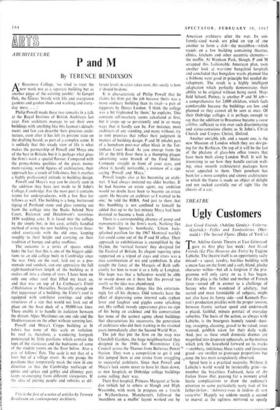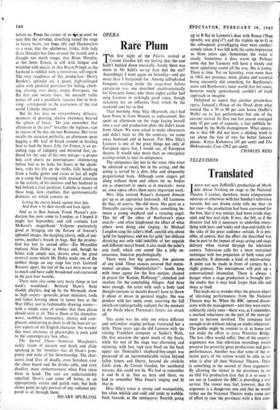THEATRE
Ugly Customers
Just Good Friends. (Adeline Gentle.)--Volpone. (Garrick.)—Trifles and Tomfooleries. (Mer- maid.)—The Sacred Flame. (Duke of York's.) E Adeline Gend'e Theatre at East Grinstead gave its first play last week: Just Good Friends (Le Plus Heureux des Trois) by Eugene Labiche. The theatre itself is an opportunity sadly missed—a squat, tawdry, hut-like building with a mean face on the front and a soft, bland, plushy character within—but all is forgiven if the pro- gramme will only carry on as it has begun. For this play is the father and mother of French farce—tossed off in answer to a challenge of Sarcey who first wondered if adultery, that sacred and most formidable of subjects, might not also have its funny side—and Kenneth Par- rott's production prickles with the proper tension, between frantic surface speed and underneath a placid, faithful, minute portrait of everyday suburbia. The basis of the action, as always with Labiche, is the bourgeois homely round—dust- ing, sweeping, cleaning, gravel to be raked, roses watered, goldfish taken for their daily walk. And, just as these small domestic dramas are magnified into desperate upheavals, so the motives which jerk the household forward on its tracks 't. —snobbery, indolence, bloat vanity and ferocious greed—are swollen to grotesque proportions but
it none the less most scrupulously observed. " Speed here is a practical necessity. Without it
Labiche's world would be intolerably grim—re- member the breathless Fadinard, hero of An Italian Straw Hat, pausing for a moment amid hectic complications to draw the audience's attention to some particularly nasty trait of his father-in-law : 'Admirez-vous la laideur de son caractere.' Happily we seldom snatch a second to marvel at the ugliness mirrored so openly before us. From the corner of an awe at most we note that the servants, slouching round the stage in heavy boots, are bone idle and blackmailers to a man; that the adulterous, frisky, little lady (Lisa Daniely) has lines around the mouth and a thought too much rouge; that Brian Murphy, as her lover Ernest, is stiff with fatigue and wrinkled with deceit; or that Bryan Pringle as the husband is riddled with a monstrous self-regard. The very roughness of this production—Henry Bardon's splendid set, a gaunt, high-ceilinged salon with plentiful provision for hiding, climb- ing, chasing over dusty, empty floorspace, the flat feet and sweaty faces, the uncouth traffic noises off and a peculiarly raucous line in bild- song—corresponds to the coarseness of the real world Labiche observed.
But he has also an extraordinary delicacy, moments of piercing, elusive sweetness beyond the sphere of farce: 'Do you remember that afternoon at the zoo?' breathes the ingenue, rapt in visions of the day she met Romance. Her lover recalls the occasion perfectly, an afternoon spent lugging a 41b. loaf of bread around in broiling heat to feed the bears. Life, for Ernest, is an un- ending saga of indignity and blistered feet, en- dured for the sake of his own mirage—a proper bed, cool sheets, no interruptions—shimmering before him as he lurks for hours in the shrub- bery, risks his life on the trellis, falls headlong from a faulty gutter and tosses at last all night on a camp bed, listening with strained attention to the activity of his mistress and her husband in bed behind a frail partition. Labiche is master of these long, slow cruelties, that quintessentially dramatic art which consists in:
Letting the cherry knock against their lips, And draw it by their mouth and back again.
And so to Ben Jonson. Frank Hauser's pro- duction has now come to London, as I hoped it might last September, and still contains Leo McKern's magnificent Volpone—particularly good at bringing out the flavour of Jonson's splendid images, the dangling cherry, milk of uni- corns, panther's breath in bags. But the produc- tion has lost its second pillar—Zia Moyeddin replaces Alan Dobie as Mosca and, though he brims with simple zest, throws away the great reversal scene which Mr Dobie made one of the noblest things on any stage last year. Leonard Rossiter apart, the rest of the cast were never up to much and have sadly broadened and coarsened in the past four months.
There were also some very nasty things in last week's woodshed: Bernard Shaw's three shoddy playlets, dug up by the Mermaid, show us high society—generals, prime ministers, lords and ladies horsing about in funny hats at the War Office and in fashionable drawing rooms— with a simple sense of wonder that these places should exist at all. This is Shaw at his shameless worst, snobbish, humourless, clumsy and com- placent, ministering in short to all the least attrac- tive aspects of the English character. No wonder this most unctuous of playwrights is pure gold to the contemporary box office.
The Sacred Flame—Somerset Maugham's sickly vision of passion and death and plain speaking in the 'twenties—has all Shaw's pom- posity and none of his showmanship. The char- acters lead lives of deadly, even boredom over the chess board and the drinks table, and even deadlier, mute embarrassment when Fate takes them in hand. The cast are understandably appalled; Shaw's cast come off better, in an appropriately coarse and garish vein; but both shows paint an ugly portrait of any audience pre- pared to sit through them.
HILARY SPURLING



































 Previous page
Previous page